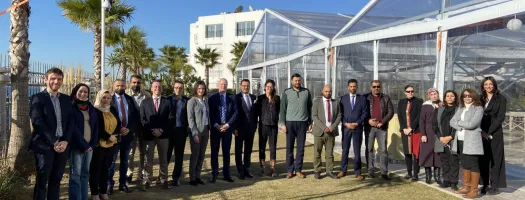The linkages between terrorism and organized crime represent a serious threat to international security and development and is an issue of growing concern for the international community. Member States have expressed increasing concerns about terrorists benefiting from organized crime as a source of financing or logistical support. These relate to trafficking in arms, persons, drugs, artefacts, cultural property, natural resources and wildlife; the abuse of legitimate commercial enterprise and non-profit organizations; illicit donations and crowdfunding; and other proceeds of criminal activity, including kidnapping for ransom, extortion, bank robbery, as well as piracy and arm robbery at sea.
The United Nations has addressed this issue through an increasing number of resolutions, including the Security Council resolutions 2482 (2019) and 2462 (2019) and the seventh review of the United Nations Global Strategy (GA 75/291) in 2021.
The nexus between terrorist groups and criminal networks is undermining stability and development efforts in many countries of the world, particularly in West and Northern African countries. Given that these regions face ever-increasing terrorist violence, addressing these challenges and the relevant security threats is one of the key priorities identified during the 2021 Global Counter-Terrorism Review.
To respond to this need, the United Nations Interregional Crime and Justice Research Institute (UNICRI) – one of the leading agencies working in this field – supports Member States by sharing knowledge and expertise, enhancing capacity, and promoting a comprehensive approach to prevent and counter the linkages between terrorism and transnational organized crime. This is done using tools such as the Nexus Policy Toolkit, based on the GCTF The Hague Good Practices on the Nexus Between Transnational Organized Crime and Terrorism.
Within this framework, UNICRI in cooperation with the Netherlands Embassy in Tunis is holding two workshops in the capital of Tunisia, Tunis, on 7-8 and 9-11 February. The workshops, conducted in partnership with the Libyan Center for Counter-Terrorism, are attended by policy-makers and practitioners. The participants represent different national agencies, including the Ministry of Foreign Affairs, the Libyan Passport Immigration, the Ministry of Interior Affairs, the Libyan Centre for Counter-Terrorism, the Attorney General Office, the Customs, the General Intelligence Service, the Mayor of Nalut, the Ministry of Culture, the Masarat Organisation, the Tadarat Organisation, the Libyan Network for Supporting Women, the International Law Center, the World Islamic Call Society, the Wesham Centre for Women’s Studies, and the media.
The workshops discuss the advantages of having an effective dialogue and cooperation between state and non-state actors to counter the phenomenon and the various good practices and challenges in the areas of local engagement and information sharing. The workshops represent an important opportunity to consult with Libyan authorities, civil society and non-governmental organisations, and to promote collaboration between different stakeholders.
Enhancing capacities to identify the linkages and convergent areas between transnational organized crime and terrorism, as well as strengthening coordination and cooperation between stakeholders are crucial steps to build an effective response to tackle this global phenomenon.


